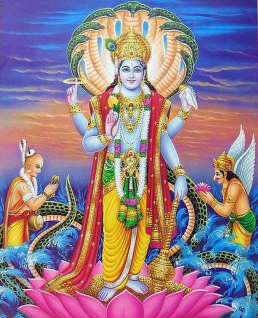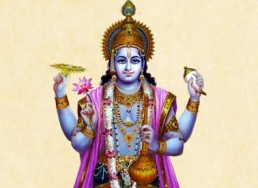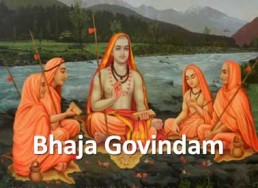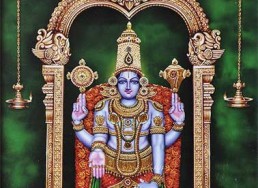Ranganatha Ashtakam
शशाङ्करूपे रमणीयरूपे श्रीरङ्गरूपे रमतां मनो मे ॥१॥
śaśāṅkarūpe ramaṇīyarūpe śrīraṅgarūpe ramatāṃ mano me ..1..
दैत्यान्तकालेऽखिललोकलीले श्रीरङ्गलीले रमतां मनो मे ॥२॥
daityāntakāle’khilalokalīle śrīraṅgalīle ramatāṃ mano me ..2..
those plays of his incarnations slaying the demons in all the lokas (Worlds); My mind delights in the divine plays of Sri Ranga (Sri Ranganatha) (those plays fill my being with bliss).
कृपानिवासे गुणबृन्दवासे श्रीरङ्गवासे रमतां मनो मे ॥३॥
kṛpānivāse guṇabṛndavāse śrīraṅgavāse ramatāṃ mano me ..3..
व्यासादिवन्द्ये सनकादिवन्द्ये श्रीरङ्गवन्द्ये रमतां मनो मे ॥४॥
vyāsādivandye sanakādivandye śrīraṅgavandye ramatāṃ mano me ..4..
त्रैलोक्यराजेऽखिललोकराजे श्रीरङ्गराजे रमतां मनो मे ॥५॥
trailokyarāje’khilalokarāje śrīraṅgarāje ramatāṃ mano me ..5..
श्रितैकभद्रे जगदेकनिद्रे श्रीरङ्गभद्रे रमतां मनो मे ॥६॥
śritaikabhadre jagadekanidre śrīraṅgabhadre ramatāṃ mano me ..6..
क्षीराब्धिशायी वटपत्रशायी श्रीरङ्गशायी रमतां मनो मे ॥७॥
kṣīrābdhiśāyī vaṭapatraśāyī śrīraṅgaśāyī ramatāṃ mano me ..7..
पाणौ रथाङ्गं चरणेऽम्बु गाङ्गं याने विहङ्गं शयने भुजङ्गम् ॥८॥
pāṇau rathāṅgaṃ caraṇe’mbu gāṅgaṃ yāne vihaṅgaṃ śayane bhujaṅgam ..8..
(Glory to Sri Ranganatha) whose hand holds the discus, from whose lotus feet river Ganga originates, who rides on his bird vehicle (Garuda); (and) who sleeps on the bed of serpent (glory to Sri Ranganatha).
सर्वान् कामानवाप्नोति रङ्गिसायुज्यमाप्नुयात् ॥९॥
sarvān kāmānavāpnoti raṅgisāyujyamāpnuyāt ..9..

Description
Ranganatha Ashtakam was written by Adi Sankara Bhagavatpada when he stood before Sri Ranganatha swamy in Srirangam, during his travels. This Ashtakam reveals that Adi Sankara was overwhelmed by Lord Ranganatha swami that his mind is instantly captivated and he revels in that feeling.
Other Vishnu Shlokams
Acyutam Kesavam
Everybody should meditate regularly upon Achyuta, Kesava, Vishnu, Hari, Satya, Janardhana and Narayana, the swan, which signifies the quintessence of things.
Akasat Patitam Toyam
As all rains falling from the sky reach the ocean; so also the prayers to all gods ultimately get to the Lord Keshava.
Apavitra Pavitro
Om, if one is Apavitra (Impure) or Pavitra (Pure), or even in all other conditions, he who remembers Pundarikaksha (another name of Sri Vishnu, literally meaning with lotus-like eyes), he becomes pure
Bhaja Govindam
Shlokams,Vishnu,Sankara,Govinda,Krishna,Prakarana Grantha
Bhaja Govindam is one of the most popular hymns penned by Adi Shankaracharya. He has packed into the Bhaja Govindam song the substance of all Vedanta, and set the oneness of Jnana and Bhakti to melodious music.
Dhanvantari Mantra
The Dhanvantari Mantra calls upon the divine healer, Lord Dhanvantari, the god of Ayurveda, for health and protection from ailments.
Kayena Vaca
Whatever I do either by body, speech, mind or sensory organs, either with my personal knowledge or natural trait, I surrender and submit all to that to supreme divine Narayana.
Lakshmi Narasimha Karavalambam
Narasimha is a fierce avatar of the Hindu god Vishnu, one who incarnates in the form of part lion and part man to destroy evil and end religious persecution and calamity on Earth, thereby restoring Dh
Mantra Pushpam
The Mantra Pushpam (literally translating to "Flower of Mantras") is a collection of sacred verses from the 10th chapter of Taittiriya Aranyaka of Krishna Yajur Veda. Each verse begins with an exploration of the relationship between the flower of…
Megha Syamam
Salutations to Sri Vishnu who is beautiful like the dark clouds, and who is wearing yellow garments of silk; Who has the mark of Srivatsa on his chest; and whose body is shining with the radiance of t
Namami Narayana Pada
I salute the lotus-feet of Narayana, always, propitiate Narayana, speak of the pure name of Narayana and bear in mind the immutable factuality of Narayana.
Narayana Kavacham
Shlokams,Vishnu,Govinda,Krishna
The Narayana Kavacham occurs in chapter eight of the sixth skanda of Bhagavada Purana. It is an Armour (Kavach) to protect ourselves from all our enemies (including negativitie
Narayanam Hrishikesam
I salute Narayana, Hrishikesa, Govinda, Garudadhwaja, Vaasudeva, Hari, Krishna and Kesava.
Narayaneti Vagvalvi
The four letters 'Na', 'Ra,'Ya', 'Na' are the four shoots on the creeper of speech and are undoubtedly indicative of the four Purusharthas- Dharma, Artha, Kaama and Moksha.
Sashanka Chakram Sakirita
I salute, prostrate with my head, to that four-armed Lord Vishnu, who is ornamented with the shankh (conch) and chakra (the divine wheel), the crown and ear-drops, yellow silk robes, lotus-eyes, decor
Shantakaram
We bow to the only lord of all worlds, Vishnu who is of peaceful appearance, reclining on the serpent, with a lotus from the navel, lord of gods, the basis of the universe, vast like the sky, coloured
Somanatha Vaidyanatha
One who remembers Somanātha (Lord Śiva), Vaidyanātha (the healer Śiva), Dhanvantari (the divine physician), and the twin Ashvinis (divine doctors of the gods) every morning will not be touched by dise
Swayam Vyakta Sthalam
First, called "Ranga", the great temple (of Srirangam), made known by the (great lord) Ranga, (Then) Srimushanam and Venkatadri, Salagrama and Naimisha, Toyadri (Thiruneermalai), Pushkara and indeed N
Venkatesa Suprabhatam
This shlokam is taken from Sri Valmiki's Srimadh Ramayanam. During the journey with Sage Viswamitra, both Rama and Lakshmana had rested for the night on the banks of the Ganga river. As the dawn was
Vishnu Sahasranamam
The Vishnu Sahasranam is found in the Mahabharatha. Literally translated this means thousand names of Vishnu. This is found in the Anushasanika Parvam (chapter relating to orders or rules to the kings) of Mahabharatha. Though it describes one…
Vishnu Shatanama Stotram
The Vishnu Shatanama Stotram is a revered hymn that encapsulates the divine attributes and various forms of Lord Vishnu, serving as a powerful invocation for devotees seeking spiritual elevation and liberation. The stotra, composed by Sri Veda…
Vishnu Shatpadi Stotram
The Sri Vishnu Shatpadi is a revered Sanskrit stotra (hymn) dedicated to Lord Vishnu, the preserver and protector in Hinduism. Composed by the illustrious philosopher and saint, Sri Shankaracharya, this hymn comprises six verses (ṣaṭpadī) that…
Ranganatha Ashtakam – Vishnu – In Sanskrit with English Transliteration, Translation and Meaning. Commentary for selected Shlokams.



